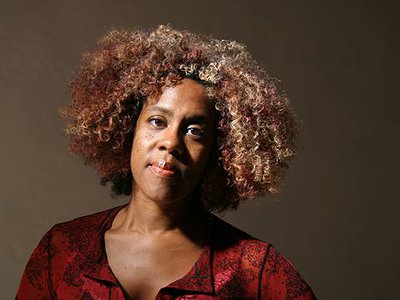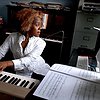Name: Errollyn Wallen
Nationality: British
Occupation: Composer
Bands/Projects: Ensemble X / Orchestre des Pays de Savoie / Frontiers Festival / Adam's Apple
Labels: NMC Recordings
Musical Recommendations: Tim Harries is one of the most exceptional musicians I know / Armenian composer Tigran Mansurian
When did you start composing - and what or who were your early passions and influences?
I remember making up tunes and songs all the time, I can still remember the song my sisters and I to sing as we walked to school. I always had music in my head. I composed a work called Frogs and Toads for all my class to perform when I was about nine. I loved dancing and came to discover classical music through the music being played in ballet class. I went home and twiddled with the knobs on the radio, trying to find the music I’d just heard. In my primary school we had a wonderful music teacher, Miss Beale, who taught us all to read and write music and who introduced us to orchestral music through playing Prokofiev’s Lieutenant Kijé.
For most artists, originality is first preceded by a phase of learning and, often, emulating others. What was this like for you? How would you describe your own development as an artist and the transition towards your own voice?
It is true that so many composers learn through copying, through apprenticeship. I never set out to be original but rather to compose the music I wanted to hear. Composing is the most brilliant way of understanding music which has been composed by others. My curiosity about all kinds of music and how it is put together drives me. Raw sound and its patterns fascinate me. To fully develop your ideas you have to keep composing and continue to expand your listening.
What were some of the most important creative challenges when starting out as a composer and how have they changed over time?
The most important creative challenges stay the same throughout your life — how to be truthful, how to be clear, how to illuminate the principles of music which are constant throughout human history. When I started out, the hardest thing was to get opportunities to stretch my wings and show what I could do. Opportunities to hear your work performed is everything to a composer.
Tell us about your studio/work space, please. What were criteria when setting it up and how does this environment influence the creative process? How important, relatively speaking, are factors like mood, ergonomics, haptics and technology for you?
I have always maintained that a composer should be able to work anywhere. Having said that, the ideal is to have silence, solitude and the minimum of disturbance. I have worked in many environments and what I unconsciously tap into is the frequencies around me; the sounds around me can creep into the work.
Could you take me through the process of composing on the basis of one of your pieces that's particularly dear to you, please? What do you start with when working on a new piece, for example, how do you form your creative decisions and how do you refine them?
That would take a chapter of a book — or a whole book! I did in fact contribute a whole chapter about composing and intuition in the book Navigating the Unknown: The Creative Process in Contemporary Performing Arts Bannerman, Christopher and Sofaer, Joshua and Watt, Jane (2006) Middlesex University Press/ResCen Publications.
I have composed works large and small and I have grown to understand my process. When writing the music for an opera, for example the characters come first. Though the libretto can take a long time to get right, I regard it as a magical skeleton and, once it’s in shape, it’s as if I have to start again from the beginning. I must then live with the characters and absorb their hidden secrets, possibilities and motivations, sometimes only hinted at on the page. I must be patient and wait until the characters become multi-dimensional and they must speak to me. I imagine their facial gestures and nervous tics before I write a note. For example in the opera Yes which premiered at the Linbury Theatre, Royal Opera House in 2011, though Bonnie Greer’s libretto doesn’t specify the character Joan’s precise location, I imagined her in a particular London square with the sound of bells coming from a nearby church. Those bells became a motif in the score.
I start by composing the vocal score which I regard as a map where the voice and text is fixed, accompanied by a piano part which serves to outline the harmonies and important instrumental lines. It is only when the vocal score is finalised that I move on to orchestration and the full score. There, the orchestra or ensemble’s job is not only to flesh out the characters but to place them in an environment where that environment is also a character. What the singers sing and the music they sing over are both important for the storytelling. The opera composer’s job is complex. We have to tell the story by breathing life into characters and also step outside of the story to comment on it. We subvert it, plant the seed of what’s going to happen later, and sometimes convey the opposite of what’s actually going on.
I have composed thirteen and a half operas to date and I think my best is The Silent Twins (libretto by April de Angelis) because of my journey with the characters June and Jennifer Gibbons. It was in that opera that I really learned that one must listen to the characters and give them life on stage through the music.
What, if anything, do you personally draw from the cosmos of electronic music and digital production tools that is inspiring for your daily practise? In how far do you see the potential for a mutual creative pollination between the two?
A composer has to consider all elements in a musical work. Timbre, rhythm, colour, texture, speed, dynamics are just some of these elements. I love working with electronics and I like making acoustic instruments aspire to electronics and the reverse. You can hear examples of this in several works including In Earth from my new album Photography and in my opera Anon where there is sound design and a club scene.
How do you see the relationship between timbre and composition?
A composer is writing time. Though I can imagine a work in a single flash, it can only be heard by the listener in linear time.
By how I shape the work (through tempo, transitions, juxtapositions) I can alter the experience of time passing for the listener. When I composed Carbon 12, a fifty minute oratorio, I set out to make it feel like a ten minute work for the listener. This idea dictated the form and structure of the work. What was uncanny is that at the première, a stranger came up to me and said, “That only felt like ten minutes!”



